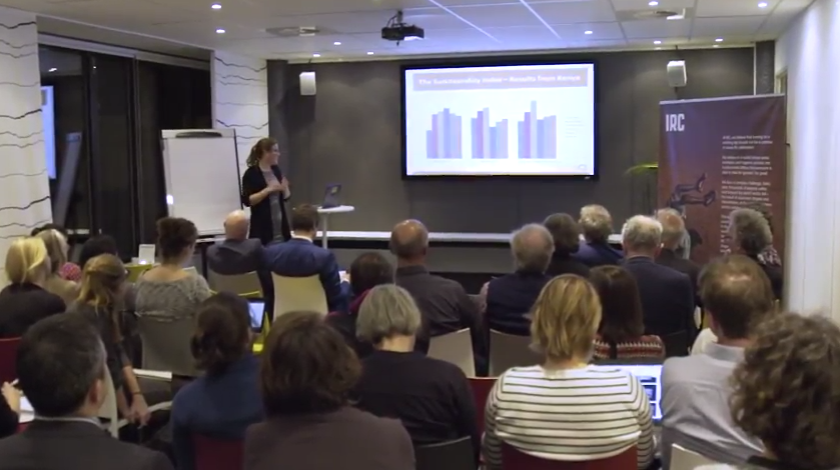Tools are not enough, engage with government for real change
Published on: 24/11/2016

As of 2017 all new Dutch-funded water, sanitation and hygiene (WASH) programmes must include a sustainability clause, Dick van Ginhoven told participants at an IRC Event on 16 November 2016. Sustainability is "bloody serious", said Mr Van Ginhoven who is a Senior Advisor Water and Sanitation at the Directorate-General for International Cooperation (DGIS).
DGIS has championed sustainability in the WASH sector for a decade. Alarmed by high numbers of non-functional WASH systems, DGIS introduced a sustainability clause into its funding arrangements in 2006. The clause makes project implementers accountable for the sustainability of the infrastructure they install. Independent auditors carry out sustainability checks to provide information on the use and functionality of WASH infrastructure. DGIS requires project implementers to write an annual management response indicating, not only which short-term corrective action they undertook but, more importantly, which long-term, structural measures they are introducing to prevent future failures.
Those applying for the Sustainable Water Fund (FDW) of the Netherlands Enterprise Agency (RVO in Dutch) will notice the influence of the new DGIS policy in the updated rules on sustainability for project proposals. Jan Paul van Aken introduced the major changes. These were related to baseline setting and sustainability measurement based on the FIETS criteria of financial, institutional, environmental, technical and social sustainability.
The same FIETS criteria are the basic building blocks of another tool presented at the IRC Event: the Sustainability Monitoring Framework and Index. Angela van den Broek of WASH Alliance International (WAI) explained how this tool is being used to optimise the chances of WASH programmes delivering sustainable services.
UNICEF was one of the first agencies to sign a sustainability clause for DGIS-funded programmes.Julia Boulenouar of UK-based Aguaconsult presented findings from 25 WASH sustainability checks that UNICEF carried out in East and West Africa, and in Asia. It is very difficult to compare or interpret results of the sustainability checks, she said. That's why standardisation of the methodology is needed. Implementing the sustainability clause helped put sustainability on the agenda. It spurred minor remedial actions. That's the positive side. What frustrates Ms Boulenouar, though, is that there is no substantial difference in how programmes are designed. Sustainability checks remain largely a UNICEF reporting tool. They are not part of national monitoring systems.
In a plenary discussion at the IRC Event speakers and participants raised the following issues:
Engaging with government
Sustainability checks shouldn't just be project tools for donors and international non-governmental organisations (INGOs). They should be used to engage with governments in fundamentally changing the way programmes are designed. Sustainability indicators should be an integral part of national monitoring systems. Donor harmonisation can support such a change so it is important that the big development banks come on board to support existing sustainability champions such as DGIS, UNICEF and USAID. Implementers should partner with these champions because they have direct links with governments. Dick van Ginhoven mentioned, for instance, that high-level government officials co-signed the management reports of UNICEF WASH programmes that have a sustainability clause.
Standardisation
There is a need to standardise and simplify methodologies, definitions and key indicators for sustainability checks. This will facilitate both learning and uptake in project design and existing monitoring systems. Dick van Ginhoven suggested that standardisation was an area that DGIS could lead in.
Sustainability has a price
Donors and implementers need to invest in sustainable services. This may mean compromising between coverage and sustainability, increasing user contributions or involving the private sector more.
Incentives
DGIS found that rewarding good behaviour worked better than applying sanctions. Making sustainability a bonus condition when applying for funding, providing a premium if faecal waste is delivered to a treatment station, are examples of incentives for such good behaviour.
Accountability to users
Donors are not the only ones who can put pressure on implementers and government to deliver sustainable services. If sustainability reports are made available to civil society organisations (CSOs) they can use this data for evidence-based advocacy.
Watch a video impression of the IRC Event "Checking and monitoring sustainability of Water, Sanitation and Hygiene (WASH) services", held in The Hague, The Netherlands on 16 November 2016. It includes short statements from the speakers: Dick van Ginhoven (DGIS), Jan Paul van Aken (RVO), Julia Boulenouar (Aguaconsult) and Angela van den Broek (WASH Alliance International) and from two participants: IRC Supervisory Board member Emiel Wegelin (UrbAct) and Fred de Bruijn (Wiiteveen+Bos).
The presentations and background documents on sustainability clauses and checks can be downloaded below under Resources.
IRC runs thematic events in The Hague, open to all interested parties. They aim to bring together professionals to network and discuss hot topics in the water, sanitation and hygiene sector. They are forward looking and multidisciplinary in nature presenting the latest thinking from governments, NGOs, private sector and academia.
At IRC we have strong opinions and we value honest and frank discussion, so you won't be surprised to hear that not all the opinions on this site represent our official policy.